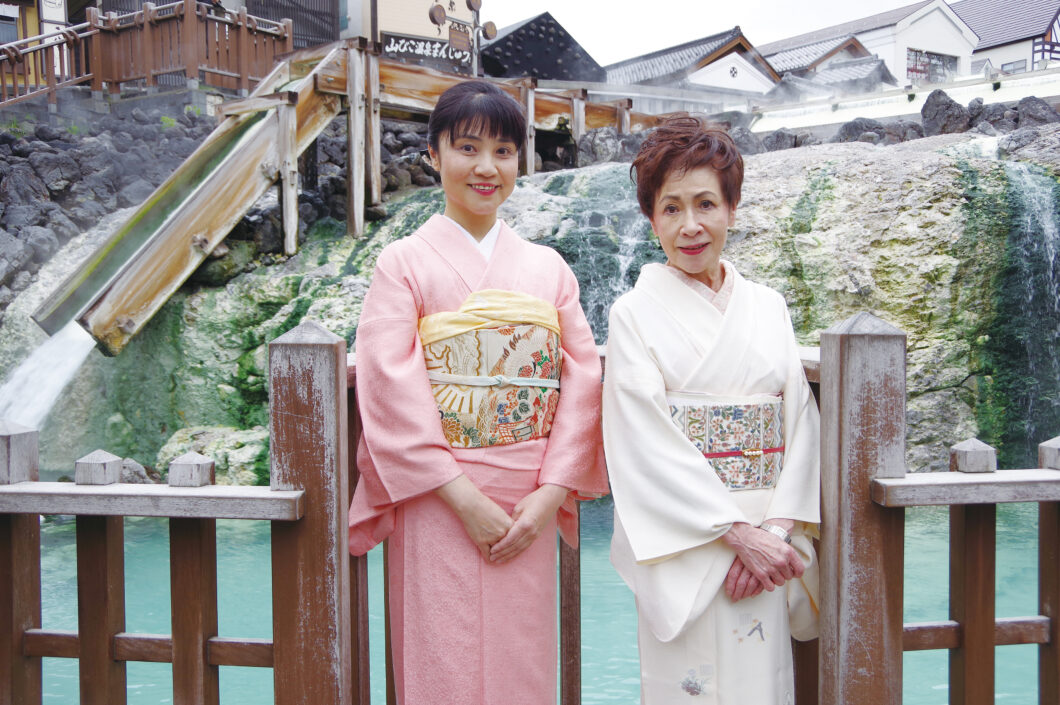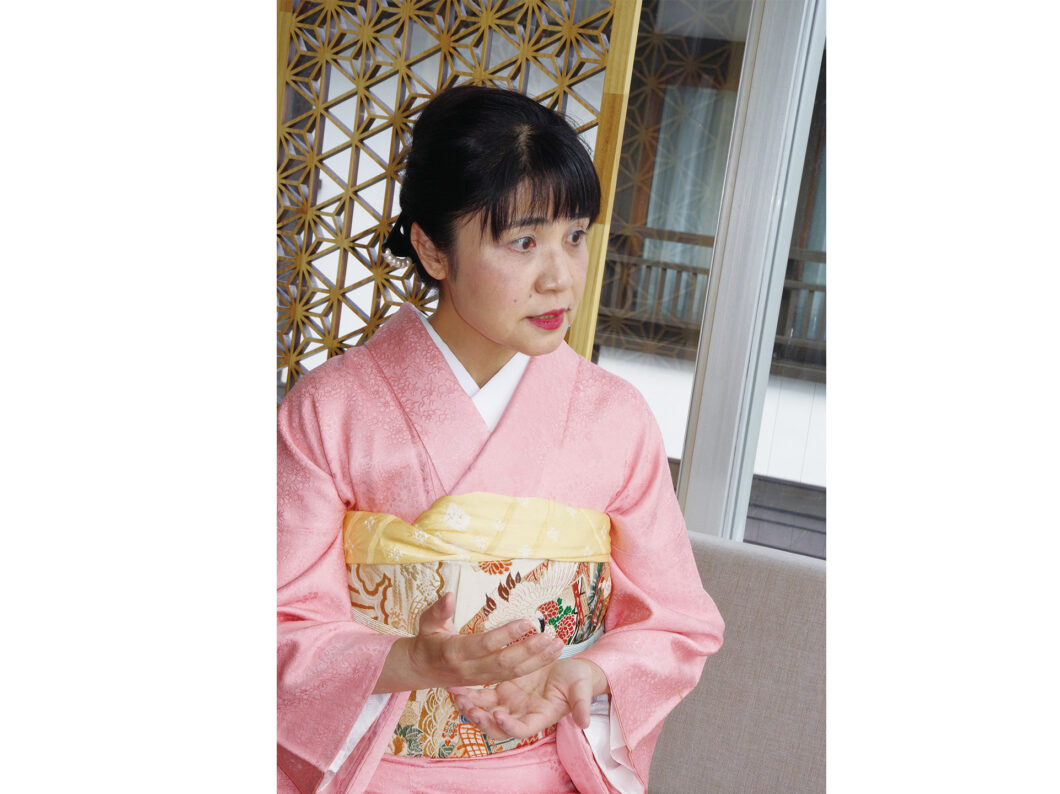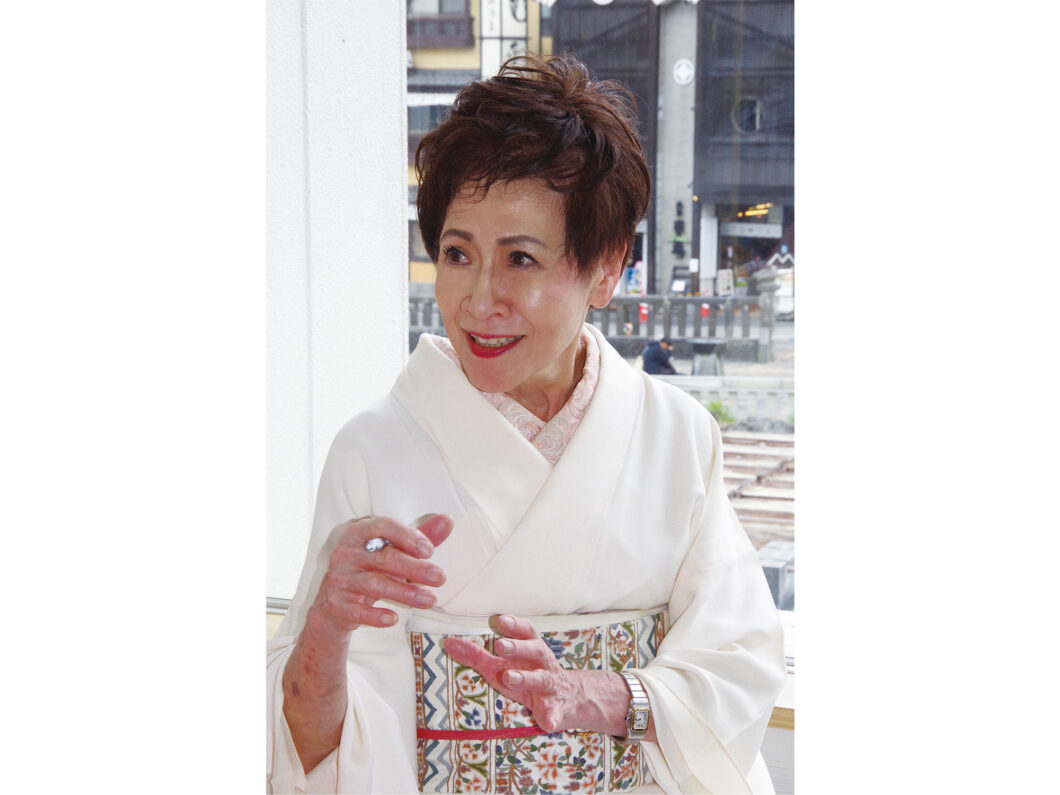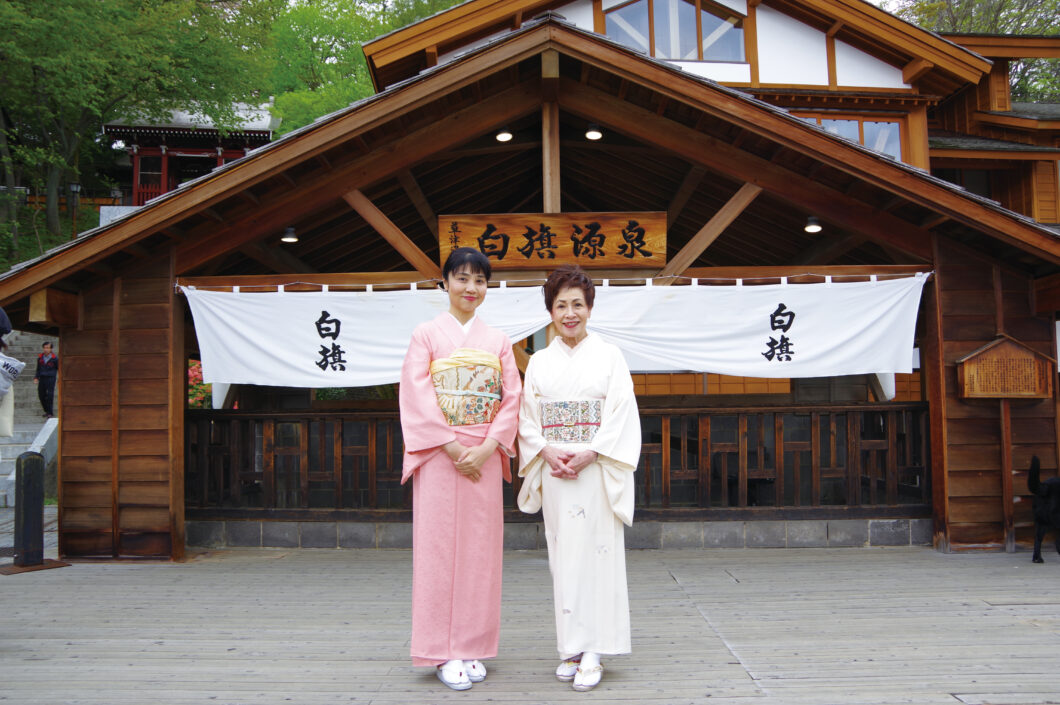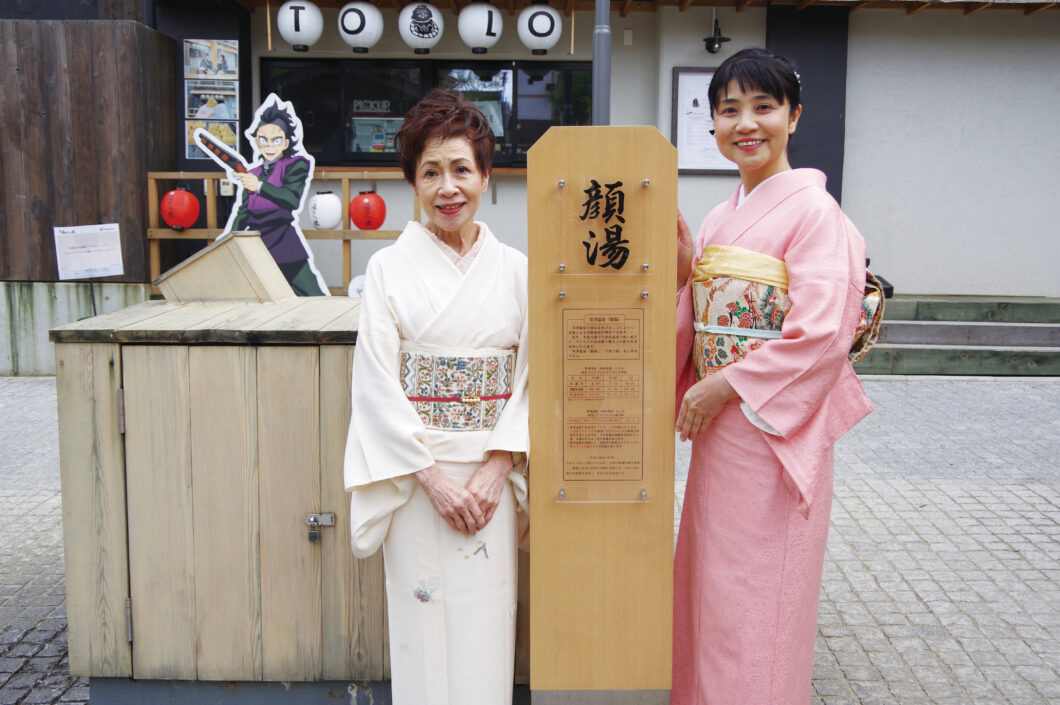Featured Articles
People involved in hot spring resorts and inns across the country are working to have "hot spring culture" registered as an intangible cultural heritage by UNESCO (United Nations Educational, Scientific and Cultural Organization).
What is the appeal of Japan's hot spring culture? And what further efforts should the relevant parties make to achieve this?
We spoke with Ichikawa Kaoru, the proprietress of Hotel Ichii , a ryokan (Japanese inn) that represents Kusatsu Onsen (Gunma Prefecture), which has been ranked number one for 21 consecutive years in the "Top 100 Hot Springs of Japan" (sponsored by the Tourism Economics Newspaper Company), and Yamazaki Mayumi, a hot spring essayist with ample experience reporting on hot springs both in Japan and overseas.
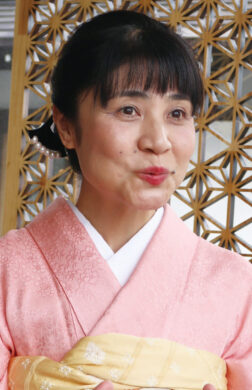
Hot Spring Essayist
Mayumi Yamazaki
Hot spring essayist and part-time lecturer at Atsumi Women's University. She has covered hot springs in Japan and 33 countries around the world, and writes on the theme that "hot springs are the identity of Japanese people." Her books include "That's why I can't stop mixed bathing" (Shincho Shinsho), which describes the original landscape of hot springs, "The joy of solo hot springs" (Kobunsha Shinsho), which encourages solo travel, "The hostess saw: the front and back of hot spring inns" (Bunshun Bunko), which describes the inside of an inn and the true faces of the innkeepers, and her latest book, "The guesthouse book tells the story of Showa 100 years: the people who showed their true faces in hot springs" (Ushio Publishing), which describes the secret stories of Showa-era stars' stays at hot spring inns. Her articles are serialized in the Tokyo Shimbun, Kanko Keizai Shimbun, Aji no Techo, and other publications. She also writes energetically for web media such as Yahoo! and Bunshun Online. She appears on "NHK Radio Midnight Flight" on the fourth Wednesday of every month. She has held many public positions, including as a judge for the Japan Tourism Agency Commissioner's Award, a VISIT JAPAN ambassador, and a participant in the Cabinet Office's "Cool Japan Academia Forum."
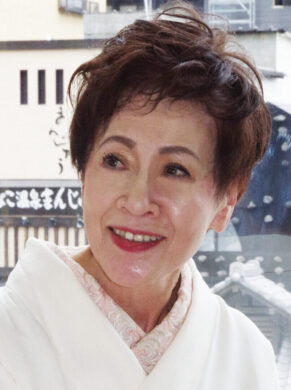
Hotel Ichii Ichii's proprietress
Kaoru Ichikawa
Originally from Omiya, Saitama City. After graduating from Showa Women's Junior College, Department of English Literature, she joined Wako in Ginza. After leaving the company, she married Ichikawa Koichiro (former mayor of Kusatsu Town), the eldest son of Kusatsu Onsen Hotel Ichii Ichii. She worked in the inn business as Ichii's proprietress. She founded the Kusatsu Onsen Proprietress Association "Yunohanakai" and became its first chairperson. She subsequently served as vice chairperson of the Gunma Proprietress Association (current position), a JTB female business committee member, and a member of the Gunma Prefecture Tourism Council. In 2010, she opened the pastry shop and restaurant Tsuki no I in front of the Kusatsu Onsen Tourism Association.
Yamazaki : There is a movement going on within the industry to have hot spring culture registered as an intangible cultural heritage by UNESCO. Washoku was registered in 2013, and last year the Agency for Cultural Affairs announced that it would recommend calligraphy for registration. Hot spring culture competed with calligraphy, and we will aim for the next opportunity to register in 2028.
Due to the nature of my job, I often have the opportunity to give lectures to people from hot spring facilities and accommodation facilities all over Japan, as well as the general public, but when I talk about "getting hot spring culture registered with UNESCO," 90% of people are unaware of the activity.
Ichikawa: Most people don't know about it.
Yamazaki: The "Hot Spring Culture UNESCO Intangible Cultural Heritage National Promotion Council" is working to turn this into a national movement. And as "Five Star Inns" will be available in bookstores from this year, the purpose of this interview is to get the general public to understand the efforts to get "hot spring culture" registered as a UNESCO heritage site.
In this context, we would like to speak to Ms. Ichikawa, the female innkeeper of Kusatsu Onsen, which has been selected as one of the "Top 100 Hot Springs in Japan" for 21 consecutive years. Thank you for your time.
Thank you Ichikawa .
Yamazaki: First, let me introduce myself. I was born and raised in Nagaoka City, Niigata Prefecture. When my parents were unable to have children, they went to Tochiomata Onsen, known as the "bath for children," about an hour's drive from their home, and that's how they had me.
I grew up hearing such stories, so I am doing my current job with the intention of giving back to the hot springs.
I started covering hot springs around the world in 2002, and have visited hot springs in 33 countries so far.
Ichikawa: There are so many hot springs all over the world.
Yamazaki: They are found not only in countries with volcanoes like Iceland, but also all over Europe.
However, what I realized while traveling around the world is that Japanese hot springs are the best.
Hot spring towns, inns, hostesses, communal baths... It feels like Japan is the only country in the world that has given added value to hot springs in the form of emotion and made it into a culture.
It is my greatest wish to have Japan's hot spring culture recognized worldwide. While reporting on hot springs around the world, I have also made efforts to introduce Japanese hot spring culture to people around the world.
Unlike Japanese food, hot water cannot be taken overseas, so we have had to go through a process of trial and error to figure out how to promote our product and how to disseminate information when we go to places like travel expos held overseas.
In recognition of these activities, I was appointed as a "YOKOSO JAPAN Ambassador" by the Ministry of Land, Infrastructure, Transport and Tourism in January 2008, before the Japan Tourism Agency was established.
It has been several years since washoku (traditional Japanese cuisine) was registered as an intangible cultural heritage by UNESCO, and in that time the number of Japanese restaurants overseas has increased 3.4-fold, while the volume of Japanese food exports has increased 2.7-fold. Many tourists are visiting Japan to try washoku (traditional Japanese cuisine).
Once hot spring culture is registered, we hope that more people from overseas will come to experience and consume Japan's hot spring culture.
I believe this will be an opportunity for Kusatsu Onsen to take flight even further on the world stage.
Ichikawa: My parents' home is in Omiya, Saitama Prefecture. I met my husband through an arranged marriage and moved to Kusatsu.
Yamazaki's family home isn't an inn, is it?
Ichikawa : Yes. My father had a very serious job - he was a police officer.
After graduating from school, I worked at Wako in Ginza. Then I moved from Ginza to Kusatsu. I had an arranged marriage in the spring and got married in the fall, so I came here without knowing what Kusatsu was like in the winter.
He was a very strict father. He often said, "A woman has no home in the three worlds," but that wherever you go, whether it be the past, future, or present, is where you live. "In the end, you made the decision, so even if you come home crying, you will not be able to enter the gates of your parents' house."
I married into a large family. For about 10 years, I worked as a maid. As my husband was the eldest son, I helped take care of my father-in-law and mother-in-law, along with other maids.
I started working at an inn about 10 years after I got married, and have been working as a hostess for the past 43 years.
When I started working at an inn, the female innkeeper was not on the front line. She worked in the kitchen, cleaning the rooms, and taking care of the staff. She worked in the back office. In the past, she was not called a female innkeeper, but rather called a wife. Then, the period of high economic growth came, and she started to be called a female innkeeper, and her job changed.
Yamazaki :Until the period of rapid economic growth, women were not what we would call hostesses today.
Ichikawa: We didn't have the custom of greeting customers in front of them.
Yamazaki welcomes the group and gives a greeting.
Ichikawa : Yes. So I think the proprietress culture is around 50 years old or so.
When I first started working at the inn, I saw the hands of the staff washing the dishes. They were all working hard even though their hands were getting soggy from the hot water. I thought to myself, "Ah, this inn is being supported by these people," and "These people's lives need to be improved."
An employee told me, "The proprietress is the flower of the inn, so you should appear in front of the guests," so I only appeared in front of the guests during banquets, and little by little I learned how to serve guests in an inn.
When I was at Wako, I learned about customer service. The most important thing is to greet customers properly.
And remembering the faces of customers. Wako is a small specialty store that started as the sales department of Hattori Watch Shop. We sell high-end products and have many regular customers, so we remember who each customer is, who they are from, and who their company is. This was very useful at the inn.
Over the past 40 years, I, a complete amateur, have been supported by many customers and colleagues to get to where I am today.
Yamazaki: You must have had a hard time.
Even in Ichikawa , the inn has chefs, waitresses, and clerks. It is with the support of these people that the inn becomes a landlady.
As for the proprietress, she is like a mother to the household.
When I went back to my parents' house, they would ask me things like, "Oh, where's your mom?", "Is only your dad here?", and "What time is he coming home?". I felt lonely when he wasn't at home.
It's reassuring to have Yamazaki here.
Ichikawa :Yes. Of course, male staff are fine when it comes to serving guests at an inn, but women seem to notice the finer details, which I think makes guests feel more at ease.
I tell my staff that the hospitality of a ryokan should be like thinking about when a loved one comes to your home. "What would you do if a loved one came to your home?" "You want to show good hospitality, right?" I think it's better for the futon to be fluffy and for the table to be wiped clean. I think that's the origin of hospitality.
Yamazaki: Nowadays, many luxury hotels are being built in big cities such as Tokyo.
The difference between such places and hot spring inns is the systematic hospitality and the considerate hospitality of the hostess and other staff. I think they are similar but not the same.
And I think the biggest difference between a hot spring inn and a hotel is the spacing.
Ichikawa-san said that it is important to remember the faces of customers. In other words, it is a non-systematic hospitality where you provide this service to this person. It is a uniquely Japanese hospitality that cannot be built into a system, where you say this at this timing, or serve this dish at this timing. This exquisite timing is something that you can't often experience in hotels overseas, and is something that Japanese people are good at. Maybe women are better at paying attention to the small details.
Ichikawa: I think that hospitality is, in a way, being a busybody. It's about asking people things like, "Are you okay?", "Watch your step," and "There are stairs up."
Yamazaki : It's the feeling of wanting to do something to help.
Ichikawa: That's right.
When we think about what hospitality is, we often hear the phrase "do it with what you have," but I think that consideration, attention to detail, and being helpful are also important.
But, putting aside older guests, I feel like young people today don't like being too nosy. Maybe we need to think about hotel-style hospitality. The culture of inns has been passed down by putting our hearts into hospitality, but I'm a little worried that young people in the future might find it annoying.
I teach at Yamazaki Women's University, and the students there seem to value human connections. However, some young people may find them annoying.
In fact, I think that people overseas are happy with this kind of Japanese service. Even if we don't speak the same language, we can still understand the desire to help out.
When I go abroad, I still remember the faces of the people who helped me when I was in trouble. I remember them very well.
To use the words I mentioned earlier, when someone helps you out, that experience forms the image of that country as a whole.
So, when foreign guests stay at a hot spring inn, I would like the hostess to come out and provide pleasant, nosy hospitality.
Ichikawa : One time, the air conditioning in the room seemed to be too strong, and a foreign customer was shrugging his shoulders as if to say he was cold. Then, a young male employee came over and brought him a lap blanket.
I praised him a lot. His thoughtfulness and consideration made me very happy.
I can understand if it's an older waitress, but to see young people have these feelings made me think that Japan still has a long way to go.
Yamazaki: I hope that this kindness will become a memory of your stay at the hot spring inn.
Ichikawa : Also, sometimes people get sick at inns. They say they've been on a long trip, they've eaten about three times as much food as they usually do, and they get a little sick in the middle of the night.
When you're traveling, you can get anxious, right? But when guests feel anxious, they are always touched by the kind staff and night watchmen who help them out. I think this is also the spirit of hospitality.
Yamazaki : It warms the heart. I'd like to promote this more. It's a rare experience that you can only get at a hot spring inn, not even at a luxury hotel. This is also part of hot spring culture.
Ichikawa: I often tell people, "Don't get the veteran's syndrome." There's nothing more frightening than the veteran's syndrome. You can do it all. You can do it perfectly. But your customers become like "objects."
In that respect, young people work really hard.
When you appear in a banquet hall for the first time, or serve food to guests for the first time, your efforts will definitely be conveyed to the guests.
That's why people say, "Don't get sick of being a veteran," and "Don't ever lose your innocence." But it does gradually disappear. People start to look like objects.
Yamazaki: I guess it means there's a sense of tension.
I think it's probably because of age that I can no longer remember Ichikawa's face (laughs).
We spoke to the hot spring inns that are at the heart of Yamazaki Onsen culture, and the hospitality provided by the inns' proprietresses and employees who are at the core of these inns.
The word "okami" (female general) is written as "female general," which is a good phrase. She is not a domineering general, but a strong-willed, kind, and considerate general manager.
By the way, is there anything else you think is important in passing on hot spring culture?
The Ichikawa Onsen culture was built up by our predecessors through a long and difficult process.
We have been doing business here in Kusatsu since the mid-Edo period, but sometimes I think about the past, for example, how we survived during wartime.
Our tourism industry is said to be a peace industry.
When wars, disasters, and other incidents occur, customers disappear. In order to preserve this hot spring culture, we must not forget the hardships of our predecessors who overcame such hardships. I think we need to keep thinking about why we are where we are today.
It's not something that just appeared out of nowhere, or was built just yesterday. There are our predecessors behind it. The people who protected the hot springs. The people who built the town. And the people who loved Kusatsu. The workers, the townspeople, the tourists. It's people like these that have built it up to what it is today.
I think it is important to understand this well and pass it on to the next generation.
We are not volunteers, we live here. We eat here. If the economy doesn't work, we can't live.
No matter how hard one inn tries, there is a limit to how much it can do. Unless the entire region develops, each hot spring inn will not develop either. It is not enough if only one inn is good. In addition to inns, there are souvenir shops, restaurants, and various other stores. I think it depends on how much cooperation we can get with these people and work on town development.
During the period of rapid economic growth, as long as it was okay for their own inn, they would turn off the lights in the entrance hall at 6pm and not let guests out.
However, now many inns in hot spring resorts provide buses to take guests to the town center, telling them to "take their time and enjoy the town."
The whole town benefits. Everyone shares the profits.
So, our inn also stopped having after-party corners and ramen corners. We told people to go outside and enjoy karaoke and ramen. I think that is the source of the current development of Kusatsu.
In order to pass on the hot spring culture to the next generation, we must make it a hot spring resort where young people can work with pride.
I can't meet up with friends because I'm told not to take weekends off. Instead, I'll have to think carefully about how I work from now on. If we don't create hot spring resorts that young people find attractive, we won't be able to move forward.
We are now in an era of declining birth rates. The concentration of population in Tokyo is exhausting the regions. We need to make young people think that they want to go back to their hometowns and do their best there. They need places to let off steam, not just places to work. We need to think about such things as a whole region.
We talked about the soft aspects of connecting Yamazaki Onsen culture from person to person, but Kusatsu Onsen is also evolving in terms of its hard aspects every day. Recently, the "Onsen Gate" and the "Ura Kusatsu Area" have been built, and new things to enjoy have been added. Is there a strong awareness of the government working together with the businesses?
Ichikawa : That's right. The government builds the box, but it's both the government and the private sector that polish it up. There is a shared awareness. If the government just built the box and said, "I don't know what happens afterwards," the hot spring resort would end up being just a deserted building. It is up to all of us local residents, including the government and the private sector, to put a soul into it.
Yamazaki : By the way, what is it about hot spring culture that you are particularly conscious of?
This is Ichikawa Toji. Many people leave after one night, but from now on, I would like to make this a hot spring resort where people can stay for two or three nights.
In the hallway of our inn, we have a guest register from 1887. One thousand people stayed there in a year, which translated into 10,000 nights. In other words, each person stayed 10 nights.
Of course, even a day is fine, but I hope you will take your time and spend some time here and there. People say that Japanese people are always rushing around, going here and there, but people from other countries take it easy, don't they?
From now on, I would like to propose a type of hot spring cure-like trip, where you take a leisurely bath in a hot spring, take a walk, and enjoy forest bathing.
But looking back at the past, it was quite an elegant time, with farmers sometimes staying for a week during the off-season.
Yamazaki : So you're going back to basics. We've just talked about foreign visitors, but are there any points that need to be changed or that shouldn't be changed in order to allow foreign visitors to experience hot spring culture and hot spring inns?
Ichikawa: After then Prime Minister Koizumi declared Japan a tourism-oriented nation in 2003, many foreign visitors began to visit, but to be honest, we also saw some problems.
But after visiting many times, I've gotten used to it. It's like when Japanese people go abroad for the first time and they have a party on the plane (laughs). There was a time like that in Japan too.
Nowadays, people overseas love Japanese food. On the other hand, Japanese people are turning away from Japanese food. They don't eat fish. They don't know how to eat it (laughs).
The style of Yamazaki Onsen Ryokan has not changed, and it shouldn't be changed.
Ichikawa: That's true.
However, if you stay for a long time, it will be hard to eat only Japanese food, so I think it's okay to have bread or a hamburger for just one meal. If we traveled to Europe for a week, we would want to eat Japanese food for just one day.
Yamazaki : I often hear stories of people still wrapping bath towels around themselves when bathing in the large communal bath, and other things like that, but I still think the style of Japanese inns shouldn't be changed.
Ichikawa: That's true. It's not like when in Rome do as the Romans do, but I think it's important for people to experience Japanese culture.
Foreigners are told that they must stay in a room with a bed, but if you really can't stand futons you can just stay in a hotel. I'd like people to experience what hot spring hotel culture is all about.
I've been talking about foreigners, but Japanese people are also moving away from tatami mats.
Yamazaki : Actually, I don't have tatami mats in my house either. I have a bed on the floor.
Ichikawa tatami seems to be becoming something for experiencing Japanese culture, and is becoming less common in everyday life.
The only places to eat on Yamazaki tatami mats are now in Japanese inns, and even inns are now offering more and more table seating.
Ichikawa: Some people of our age have bad knees, and young people have never sat on tatami mats in the first place. We've been eating at chairs and tables since we were born. The Japanese lifestyle has become Western-style, so even in a ryokan, we need chairs and tables to stay comfortable.
Yamazaki: I would like to see each hot spring area communicate its hot spring culture more clearly using a variety of media. Kusatsu Town has information about its history on its website, and at the Yubatake there is a monument to "One Hundred People Who Walked in Kusatsu," a group of people with ties to Kusatsu. It's wonderful that it's clearly stated in a place that is naturally eye-catching.
Also, I would like to see more emphasis placed on the meaning of how long ago Japanese people would relax at hot spring inns - "touji" (a form of therapeutic bathing).
In a lecture I gave previously, I said that people in the past knew more about how to use hot springs than people today. While acidic water has a sterilizing effect, it can cause sores on some people, so on the way home from Kusatsu Onsen, people would take a "finishing bath" at Shima Onsen before going home. When I tell people things like that, they say, "Oh really?" They didn't know that.
However, during the period of rapid economic growth, hot spring resorts became places of entertainment, primarily for group tour banquets, and were reduced to places only for lodging.
I think the first step towards achieving UNESCO registration is for those involved to clearly display and explain the hot spring culture that our predecessors have built up, so that the general public can understand it.
I think the power of Ichikawa Onsen is incredible. Hot springs are good for your health and have a healing effect. They have an economic effect on the local area, as well as an educational effect. In a sense, hot springs are also a place for children to learn how to take a bath in front of many other people. It's about acquiring social skills. You can see this from the fact that school trips are always part of school education.
I believe hot springs have six powers: health power, healing power, cultural power, economic power, educational power, and culinary power. I would love for many people to experience them.
Yamazaki: When I come to Kusatsu Onsen, I first walk around the Yubatake. Then, starting from the Yubatake, I visit the public baths. Shirahata no Yu and Goza no Yu. I like the Jizo source hot spring, so I always go to Jizo no Yu. I feel relaxed when I see the old-fashioned wooden bathhouse.
As for how to enjoy Kusatsu Onsen, I recommend walking around the town. Walking is good for your health. Kusatsu is shaped like a mortar around the Yubatake hot springs, and there are many narrow alleys. It has the advantage of being a place where you can enjoy walking around the town. Even in hot spring areas without streetscapes, there is nature there. Just by walking, you can come into contact with nature, and you can come into contact with a variety of people, not just those who work in inns, but also those who cultivate the fields.
When you visit Yamazaki Public Baths, you will often see local people bathing there. I think one of the joys of hot springs is sharing the waters with the people who live in the hot spring resort. In hot spring resorts that don't have public baths, I think it would be good to have exhibits or tools that allow people to feel and reminisce about the history behind the creation of the hot spring resort and inns. I would like to see the hot spring culture that has been cultivated by the Japanese people and is unique to each region be communicated to more people, including young people and foreigners.
Ichikawa: That's true.
Yamazaki: Finally, could you tell us about your expectations for the UNESCO registration?
When astronaut Noguchi Soichi was asked, "What would you like to do when you return to Earth?" he said he wanted to take a bath in a hot spring.
Pitcher Kazuhiro Sasaki, who played for the Seattle Mariners in Major League Baseball, also said that he would like to take a dip in a hot spring when he returns to Japan.
Hearing that really cheered me up. "That's right. People who go abroad miss hot springs, which are part of Japanese culture." I still haven't forgotten that.
That's why, no matter what happens, I want to convey to future generations that hot springs are the identity and home of the Japanese people.
We hope to spread awareness of the importance of this hot spring culture to the general public so that it can be registered as an intangible cultural heritage by UNESCO as soon as possible.
In Japan, there is calligraphy, flower arrangement, and incense-ceremony. They are all "ways", aren't they? The author Kundo Koyama wrote a book called "The Way of the Bath." I thought that made sense.
We, those of us involved with inns and hot springs, feel that the path of hot springs is something we need to think about.
And we need to communicate this to as many people as possible. If we don't communicate it, it won't get through to them.
Yamazaki Onsen is not just a place to bathe and become beautiful and healthy, it also has 1,300 years of Japanese history.
So, while I was worried that the inn must be having a very difficult time during the coronavirus pandemic, I also believed that the hot water, which has been available for 1,300 years, will never run out, and that we would definitely see the light at the end of the tunnel.
This hot spring culture has continued despite wars and other events.
The Japanese spirit is in hot spring culture, and the Japanese spirit is in hot spring culture. I want this to be more recognized around the world. And I want it to be an opportunity for Japanese people to reevaluate it. To that end, I want to see it registered as an intangible cultural heritage by UNESCO.
Ichikawa: To achieve that, we need to get more people to know about this movement. We will do our best.

